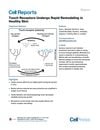75 citations,
September 2015 in “Acta biomaterialia” Alkylation of human hair keratin allows for adjustable drug release rates in hydrogels for medical use.
66 citations,
June 2020 in “Advanced Intelligent Systems” Surgical robots have improved but still can't perform tasks or make decisions on their own.
September 2023 in “Membranes” 3D-printed membranes with smart sensors can greatly improve tissue healing and have many medical applications.
 37 citations,
September 2018 in “Psychoneuroendocrinology”
37 citations,
September 2018 in “Psychoneuroendocrinology” Finasteride treatment in male rats causes long-lasting effects on depression-like behavior, brain cell growth, inflammation, and gut bacteria composition.
 31 citations,
November 2016 in “Cell Reports”
31 citations,
November 2016 in “Cell Reports” Touch sensitivity in mouse skin decreases during hair growth due to changes in touch receptors.
 127 citations,
January 2013 in “PLOS ONE”
127 citations,
January 2013 in “PLOS ONE” Probiotic bacteria improved skin and hair health in aged mice.
 12 citations,
January 2018 in “Biomaterials Science”
12 citations,
January 2018 in “Biomaterials Science” Softer hydrogel surfaces help maintain hair growth-related functions in skin cells.
 November 2023 in “Global journal of medical research”
November 2023 in “Global journal of medical research” Understanding the properties of hyaluronic acid helps improve its use in facial aging treatments.
11 citations,
November 2021 in “International journal of molecular sciences” Gut microbes significantly affect brain steroid levels.
 11 citations,
July 2022 in “Journal of Materials Science: Materials in Medicine”
11 citations,
July 2022 in “Journal of Materials Science: Materials in Medicine” A new hydrogel with stem cells from the human umbilical cord speeds up healing in diabetic wounds.
1 citations,
March 2024 in “Nanomaterials” Biomimetic scaffolds are better than traditional methods for growing cells and could help regenerate various tissues.
 3 citations,
September 2022 in “Frontiers in psychiatry”
3 citations,
September 2022 in “Frontiers in psychiatry” University students in Egypt experienced high stress during COVID-19's third wave, with negative coping mechanisms being more common.
 October 2024 in “Journal of Plant Growth Regulation”
October 2024 in “Journal of Plant Growth Regulation” Fusarium sp. strain K-23 helps Arabidopsis plants grow better in salty soil by promoting root hair growth.
 22 citations,
August 2019 in “Environmental research”
22 citations,
August 2019 in “Environmental research” Pseudomonas sp. T5-6-I bacteria increase selenium uptake in Brassica oleracea plants by 130%.
 28 citations,
May 2015 in “Addiction Biology”
28 citations,
May 2015 in “Addiction Biology” Prenatal stress changes how male and female rats enjoy rewards differently, linked to sex hormones.
 438 citations,
October 2010 in “Oncogene”
438 citations,
October 2010 in “Oncogene” Keratins help protect cells, aid in cancer diagnosis, and influence cancer behavior and treatment.
 34 citations,
October 1982 in “Journal of applied polymer science”
34 citations,
October 1982 in “Journal of applied polymer science” Moisture content significantly affects how human hair breaks.
 1 citations,
July 2022 in “Functional foods in health and disease/Journal of functional foods in health & disease”
1 citations,
July 2022 in “Functional foods in health and disease/Journal of functional foods in health & disease” Taking a probiotic supplement twice a day improved hair growth, skin hydration, and metabolic health in adults at risk of metabolic syndrome.
 1 citations,
April 2021 in “Current Stem Cell Reports”
1 citations,
April 2021 in “Current Stem Cell Reports” Eating less can improve stem cell function and increase lifespan.
186 citations,
December 2012 in “Current opinion in cell biology” Keratin proteins are increasingly recognized as important for cell health and are linked to many diseases.
 2 citations,
December 2019 in “Neurobiology of Stress”
2 citations,
December 2019 in “Neurobiology of Stress” Changing allopregnanolone levels in baby rats affects their adult behavior and alcohol use.
 29 citations,
July 2004 in “Pharmacology, Biochemistry and Behavior”
29 citations,
July 2004 in “Pharmacology, Biochemistry and Behavior” Finasteride reduces alcohol withdrawal effects, especially in female mice.
32 citations,
January 2017 in “Physiology & Behavior” New hair growth corticosterone levels are higher in diabetic mice, indicating long-term stress.
 34 citations,
August 2005 in “Dermatologic Clinics”
34 citations,
August 2005 in “Dermatologic Clinics” Stress and emotional factors can worsen skin conditions by affecting the immune system.
 194 citations,
March 2003 in “American Journal of Pathology”
194 citations,
March 2003 in “American Journal of Pathology” Stress stops hair growth in mice by causing early hair growth phase end and harmful inflammation through a specific nerve-related pathway.
 108 citations,
July 2004 in “American Journal of Pathology”
108 citations,
July 2004 in “American Journal of Pathology” Stress increases a factor in mice that leads to hair loss, and blocking this factor may prevent it.
 76 citations,
March 2005 in “Journal of Molecular Medicine”
76 citations,
March 2005 in “Journal of Molecular Medicine” Certain mice without specific receptors or mast cells don't lose hair from stress.
 34 citations,
April 2014 in “Psychopharmacology”
34 citations,
April 2014 in “Psychopharmacology” Stress and alcohol affect brain chemicals differently in rats, mice, and humans, influenced by genetic differences.
 38 citations,
April 2018 in “Psychopharmacology/Psychopharmacologia”
38 citations,
April 2018 in “Psychopharmacology/Psychopharmacologia” Blocking CRF-R1 can reduce alcohol intake in stressed mice.
 19 citations,
March 2019 in “Behavioural Brain Research”
19 citations,
March 2019 in “Behavioural Brain Research” Finasteride use can cause depression-like behavior in male rats.






















